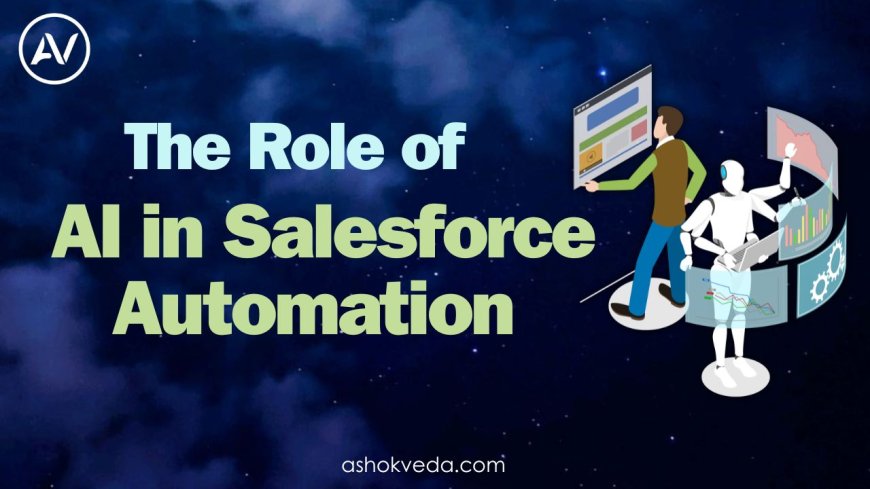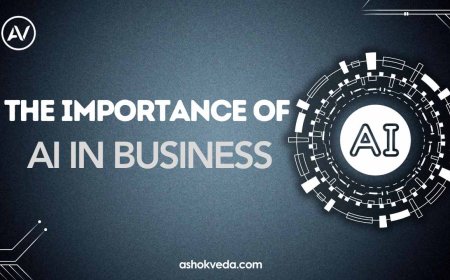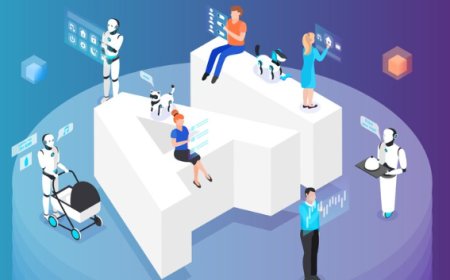The Role of AI in Salesforce Automation
Explore the role of AI in Salesforce automation, enhancing CRM efficiency, data analysis, lead management, and customer engagement with advanced AI solutions.

If you've ever thought about how to improve the process and effectiveness of your sales operations, we'll look at the function of AI in salesforce automation. AI in Salesforce has transformed how companies manage customer interactions and sales operations. Companies can use AI in Salesforce to automate boring operations, acquire deeper insights into their data, and ultimately achieve better business results. Whether you're new to Salesforce or an experienced user, knowing the impact of AI in Salesforce can help you improve your operations. Let's look at how AI is changing Salesforce automation and introducing new productivity to companies.
What is Salesforce Automation?
Salesforce automation refers to the use of software tools to streamline various sales processes. This includes everything from managing customer relationships and tracking sales activities to automating workflows and generating reports. The goal is to improve efficiency, reduce manual effort, and provide better insights into sales performance.
The Emergence of AI in Salesforce
With the integration of AI in Salesforce, the platform has become even more powerful. AI brings advanced capabilities like predictive analytics, Natural Language Processing (NLP), and Machine Learning to Salesforce, enabling it to perform tasks that were previously manual or impossible. Let’s delve into the specific ways AI is enhancing Salesforce automation.
Enhancing Data Management
One of the primary roles of AI in Salesforce is enhancing data management. AI algorithms can analyze vast amounts of data to identify patterns and trends that might not be apparent to human analysts. This helps in maintaining clean and accurate data, which is crucial for making informed business decisions.
Predictive Analytics
Predictive analytics is a significant benefit of AI in Salesforce. By analyzing historical data, AI can predict future outcomes, such as which leads are most likely to convert into customers. This allows sales teams to prioritize their efforts on high-potential leads, improving conversion rates and overall sales performance. In industries like AI in healthcare and AI in finance, predictive analytics can foresee patient needs or market trends, enhancing decision-making processes.
Personalized Customer Interactions
AI in Salesforce enables personalized customer interactions. AI can analyze customer data to provide insights into customer behavior and preferences. This allows sales teams to tailor their interactions to each customer’s unique needs and preferences, enhancing customer satisfaction and loyalty. For example, using neural networks and AI algorithms, AI can recommend products or services based on past customer interactions.
Automating Routine Tasks
AI in Salesforce excels at automating routine tasks. For instance, AI can automatically update customer records, schedule follow-up reminders, and generate sales reports. This frees up time for sales teams to focus on more strategic activities, such as building relationships and closing deals. AI software in Salesforce ensures that these tasks are performed quickly and accurately.
Natural Language Processing (NLP)
Natural language processing (NLP) is another exciting application of AI in Salesforce. NLP allows AI to understand and interpret human language, enabling features like chatbots and virtual assistants. These tools can handle customer inquiries, provide instant support, and even guide customers through the sales process. NLP is a key component in AI applications that involve customer interaction.
Lead scoring
is a critical aspect of sales automation, and AI in Salesforce enhances this process significantly. AI algorithms can score leads based on various criteria, such as engagement level, demographics, and past interactions. This helps sales teams focus on the most promising leads, improving efficiency and effectiveness. In fields like AI in education, lead scoring can be used to identify students who may need additional support or resources.
Enhancing Forecasting Accuracy
Accurate forecasting is essential for effective sales planning. AI in Salesforce can analyze past sales data and market trends to provide more accurate sales forecasts. This helps businesses plan their resources better and set realistic sales targets. In sectors like AI in finance, accurate forecasting can predict market fluctuations, helping businesses stay ahead of the curve.
AI-Powered Insights
AI in Salesforce provides powerful insights through dashboards and reports. These insights help sales managers understand their team’s performance, identify areas for improvement, and make data-driven decisions. AI-powered insights are more accurate and comprehensive than traditional reporting methods. AI research continuously improves these capabilities, ensuring that businesses benefit from the latest advancements.
Integrating AI with Salesforce
Integrating AI with Salesforce is relatively straightforward, thanks to Salesforce’s robust ecosystem. Tools like Salesforce Einstein and third-party AI solutions can be seamlessly integrated into the Salesforce platform, providing businesses with powerful AI capabilities without significant IT overhead. AI startups often develop innovative solutions that can enhance Salesforce functionality.
Case Study: AI in Salesforce at Work
Let’s look at a real-world example of AI in Salesforce. A retail company integrated AI into their Salesforce platform to enhance their customer service. By using AI-powered chatbots, they were able to handle customer inquiries 24/7, providing instant support and freeing up their customer service team to handle more complex issues. Additionally, AI algorithms analyzed customer purchase data to provide personalized product recommendations, increasing sales and customer satisfaction.
Future Trends in AI and Salesforce Automation
The future of AI in Salesforce looks promising, with continuous advancements in technology. Here are some trends to watch:
Enhanced Personalization
AI will enable even more personalized customer experiences, leveraging deeper insights into customer behavior and preferences.
Improved Predictive Capabilities
Predictive analytics will become more accurate and sophisticated, helping businesses anticipate market trends and customer needs more effectively.
Increased Automation
More tasks will be automated, from complex workflows to advanced data analysis, further reducing manual effort and improving efficiency.
Integration with Other Technologies
AI in Salesforce will increasingly integrate with other technologies, such as the Internet of Things (IoT) and blockchain, to provide even more comprehensive solutions.
Overcoming Challenges with AI in Salesforce
Despite its many benefits, implementing AI in Salesforce comes with challenges. Data quality is paramount; poor data can lead to inaccurate predictions and insights. Ensuring data privacy and security is also crucial, given the sensitive nature of customer data.
Businesses must also invest in training their teams to use AI tools effectively. Without proper understanding, the full potential of AI in Salesforce may not be realized.
Practical Tips for Implementing AI in Salesforce
-
Start Small: Begin with pilot projects to test the effectiveness of AI solutions before scaling up.
-
Ensure Data Quality: Clean and accurate data is essential for AI to provide meaningful insights.
-
Invest in Training: Equip your team with the necessary skills to leverage AI tools effectively.
-
Monitor and Adjust: Continuously monitor the performance of AI solutions and make adjustments as needed.
The impact of AI on Salesforce automation is transformational. AI is transforming corporate operations by improving data management, delivering predictive insights, customizing customer interactions, and automating routine chores. Understanding and implementing AI in Salesforce can greatly increase efficiency, improve business outcomes, and create a competitive advantage. As technology advances, the integration of AI in Salesforce will become increasingly important to corporate success. Begin exploring the possibilities today and learn how AI in Salesforce might improve your sales operations!





































